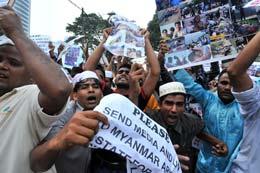Canada aid to Burma will help thousands

The Canadian International Development Aid Agency (CIDA) has pledged a total of US$4.2 million in humanitarian aid to causes in Myanmar.
At a recent All Burma Ethnic Cultural Event, Oxfam Canada, UNICEF and several other charities were allocated funds from the package towards their respective humanitarian efforts in the Southeast Asian country.
“Despite some recent positive political developments in Burma [Myanmar], the humanitarian situation in many border areas of the country remains very difficult,” said Canadian Minister of State Tim Uppal in a statement following the event.
“Canada’s support will help to ensure that life-saving humanitarian assistance including food, water, shelter and protection is provided to the most vulnerable people affected by the conflict,” he said.
The aid packages will go towards food, education, training, sanitation and basic supplies for IDPs across Rakhine, Kachin and Myanmar’s southernmost states.
“I would like to convey my heartfelt appreciation to the Government of Canada for Canada’s commitment in providing crucial humanitarian assistance to the most vulnerable people in Burma’s ethnic regions,” said Zaw Kyaw, spokesperson for the Burma Ethnic Network-Canada.
Tens of thousands of Burmese people are living in crisis due to violence and conflict, which has resulted in large-scale displacements and worsening humanitarian conditions.
Between 75,000—100,000 Burmese—mostly women and children—have been displaced due to conflict and are living in makeshift camps in Kachin and Shan States, or in neighbouring China. In addition, in June and October 2012, violent communal clashes in Rakhine state resulted in the displacement of more than 100,000 people.
“Canada is helping ensure that Burmese people affected by crisis receive the emergency life-saving support they need,” said Uppal.
“Canada’s support will help to improve health, living conditions, and protection for those living in conflict-affected areas of the country.”
Canada provides humanitarian assistance to the most vulnerable people facing natural disasters and conflict. The Economic Action Plan 2013 affirms Canada’s commitment to providing humanitarian assistance. The new Department of Foreign Affairs, Trade and Development will maintain the mandate of poverty alleviation and help achieve greater efficiency, accountability and focus to continue to improve the lives of people in need around the world.
The largest ethnic group is the Burman people, distantly related to the Tibetans and Chinese. Burman dominance over Karen, Shan, Rakhine, Mon, Rohingya, Chin, Kachin and other minorities has been the source of considerable ethnic tension and has fuelled intermittent protests and separatist rebellions.
Military offensives against insurgents have uprooted many thousands of civilians. Ceasefire deals signed in late 2011 and early 2012 with rebels of the Karen and Shan ethnic groups suggested a new determination to end the long-running conflicts, as did Chinese-brokered talks with Kachin rebels in February 2013.
Simmering violence between Buddhists and the Muslim Rohingya erupted in 2013, the official response to which raised questions at home and abroad about the political establishment’s commitment to equality before the law.
A largely rural, densely-forested country, Burma is the world’s largest exporter of teak and a principal source of jade, pearls, rubies and sapphires. It has highly fertile soil and important offshore oil and gas deposits. Little of this wealth reaches the mass of the population.
The economy is one of the least developed in the world, and is suffering the effects of decades of stagnation, mismanagement, and isolation. Key industries have long been controlled by the military, and corruption is rife. The military has also been accused of large-scale trafficking in heroin, of which Burma is a major exporter.
The EU, United States and Canada imposed economic sanctions on Burma, and among major economies only China, India and South Korea have invested in the country.
Burma’s wealth of Buddhist temples has boosted the increasingly important tourism industry, which is the most obvious area for any future foreign investment.
Leave a comment









